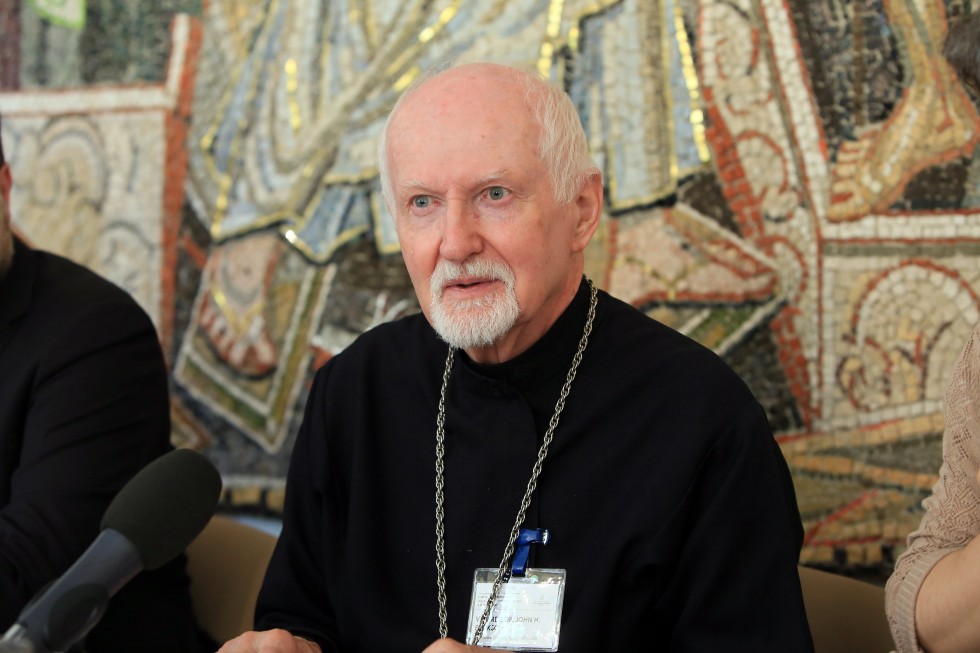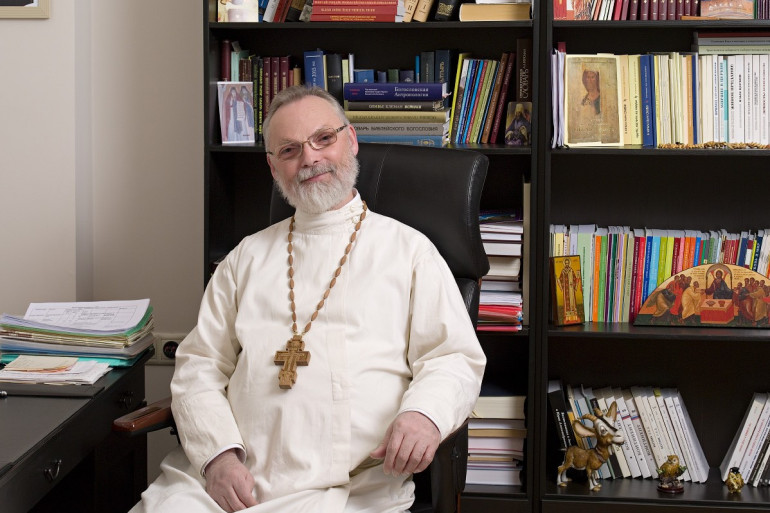Using Theology’s Nuclear Potential Peacefully

In this publication, we interview Fr. John Erickson, Professor Emeritus of St. Vladimir’s Orthodox Seminary in New York, and Fr. Georgy Kochetkov, Rector of St. Philaret’s Christian Orthodox Institute, in Moscow.
1. What lines of thought and issues do you consider to be the most significant for contemporary theology?
Fr. John Erickson: I think that the most important theological problems at this point are related to the changes in our modern way of thinking and living. Until recently, the theological enterprise primarily required a good knowledge of the past – of history and sometimes foreign languages. This historical approach was more natural to theology. Of course these things are still important today, but they are not always sufficient to the task of proclaiming Christ convincingly, as they take time. It is rather difficult to get through to modern man. These days there are so many possibilities, so many sources and means of information; these both capture people’s interest and pull people apart, hindering their ability perceive their faith in an integral way, as a whole.

Fr. John Erickson, Professor Emeritus of St. Vladimir’s Orthodox Seminary in New York
Sometimes in modern orthodox theology, two diametrically opposing tendencies collide. On the one hand, there is significant interest in orthodoxy in non-orthodox countries, perhaps relating to broad, ecumenical views – especially when there is fellowship with Christians from other confessions and a general feeling for their difficulties and joys. But at the same time, there is always the danger of self-enthrallment, when we sit around singing the praises of “holy orthodoxy”, cutting ourselves, our peoples and our countries off from others. This is one of the temptations of modern orthodoxy. In the US we meet with both tendencies. I’m afraid that all too often the orthodox have enjoyed fighting with each other. For some reason it has always been easy to call each other heretics. My hope is that we won’t fall prey to these temptations, and that we orthodox will have more opportunities to work together and get to know each other in such a way that we would keep fellowship face-to-face, rather than just flinging words at each other over Internet sites. It seems that this should be easy for believers, but, in the course of life, it doesn’t always turn out this way.
Another important question regards education. And it’s not even just a case of wanting theology students and everyone involved in the life of the church to have a good basis in various theological disciplines, such as Scripture, ecclesiology, and homiletics. It’s more important that people have access to an authentic experience of church life, rather than coming together in groups which are organized around specific theological interests, or cliques within these groups, which represent one or another point of view. Without fellowship, all this will only carry us further apart from each other, rather than bringing us closer together.
Fr. Georgy Kochetkov: It’s difficult to answer this question, because it isn’t very clear what modern theology is – I mean that it is unclear what it is based on, where it comes from, and what its goal is. Personally, I’m sure that at the moment it is difficult to find creative, grace-filled theology that is spouting with life. After the achievements of the 20th century in the Orthodox, Roman Catholic and various Protestant churches – after such breakthroughs in Biblical Studies, Church History, Ecclesiology1, Pneumatology2, and even Paterology3, it’s difficult to say anything new. On the one hand, traditional theology, as previously found in the church, has narrowed. On the other hand, it has widened. We call everything “theology”, including “Pastoral Theology” and Comparative Theology”…and teaching on the human person, or anthropology, is also sometimes called “theology”.

Fr. Georgy Kochetkov, Rector of St. Philaret’s Christian Orthodox Institute
As a matter of fact, anthropology is the hottest topic in the church at the moment, and a part of the Christian inheritance which is rife with prospects for development. Yet unfortunately, little has thus far been done to develop the field. Christianity faces a task which is daunting and fundamental to the faith – to recast all the traditional, ancient symbolic and linguistic baggage of its age-old wisdom in the language of modern Philosophical and Theological Anthropology. We need to take a new look at everything at this point, this time starting from the perspective of the human person. Before it was common to take eternity and/or God as a sort of point of departure – and this often meant assuming some idea of the ontology of divine life as a starting point. At this point we need to speak in an entirely different fashion, using the existential language of divine-human experience, insofar as this is accessible, comprehensible, known, and intelligible to us.
We are desperately lacking a new perspective on the human person and there isn’t enough theological thinking which is able to handle the issues people face in modern life, so that these people can be fed. Theology needs to feed people at the level of the height of human reason, in which human beings have a share via the divine Logos. It also needs to feed their spirit, which likewise may be only human, or it may be divine-human.
There have already been some breakthroughs in this area in the history of theological thought. Not many, though. Let’s put it this way: on the holy fathers alone, it’s difficult to get very far. That goes for the scripture, too. And this is so, because although scripture speaks of important matters relating to man as an individual human person and as a fellowship of human beings which manifests sobornost and community, no matter what breakthroughs we come up with here, it’s not enough. Even the terminology isn’t enough…the language we need to use hasn’t been entirely worked out yet – it’s only just being born. We have to return to the experience of the Christian mystics and anthropologists – the people, who have already gone through the motions of trying to perceive God beginning from the perspective of the human person.
We have to collect and somehow systematize the experience that we already have, and especially that which has accumulated since the mid-19th century with the genesis of existentialism in the work of Kirkegaard, Khomyakov, Dostoyevsky, Berdyaev, and others. I have attempted to do this in laying down the foundations for teaching on the human person for use in catechesis or, more accurately, mystagogy (introduction to the Mysteries of the Church). Of course what I’ve done isn’t comparable with academic – let alone scholastic – theology. Having thrown down a few notes and written a small book4 on the subject, I have realized the scope of the tasks we are dealing with and how much work we have left to do. At the moment, we couldn’t even say that the basic categories of Christian thought, which takes the human person and the existential experience of the Church as its departure point, and is based on the principles of personhood and sobornost.
2. Does theology have any influence on the real life of the modern church?
Fr. John Erickson: I hope that modern orthodox thought is preserving and will preserve the historical continuity of the tradition. In many parts of the world, it seems research in the field of scripture remain significant. When, several years ago, I was teaching at an orthodox seminary in Africa, practically the only thing I could be sure of was that every student had a copy of the Bible. It seems that the tradition of preaching on the Gospel of the day (from the lectionary) will be kept, although the examples of the saints can also be very productive for preaching and enlightenment. But regardless of what a preacher takes as his topic, if his goal is only to correct our behaviour, praise our church institutions, or underscore the importance of obedience, then it isn’t always very attractive to follow such a faith – and more often than not these are exactly the accents we hear in preaching. Such accents cultivate pride and self-righteousness. Rather than all this, I suspect that it is right for us to have humility in all times, knowing our guilt before God and his mercy. It is a good thing for us to avoid the temptations of the Pharisees and relate ourselves more with the “tax-collectors”, with the outcasts of society, with people who have different dependencies, with those who are forced to the margins.
I think that for theological perceptions to have an actual influence on a person, he or she has to really participate in the life of the church. This is particularly true of younger people. It is insufficient to simply know your catechesis well, though perhaps this does have some use, too. Church fellowship is paramount, as well as participation in the life of people who don’t have what you do have. And I don’t mean financial participation only, but real human care for them. In my youth, I wasn’t very interested in sport, but liked to read a lot. I could read whenever and wherever I was. But I received the greatest joy from reading to blind people and others, who couldn’t see well enough to read. It is such a joy to give joy to someone else. I think this is an experience of principle importance for each of us, and especially for young people. When you are young, it’s easy to take up anything; but if you remain focused only on yourself and on your own ideas, then this is of little use.
Another temptation that is growing over time is that we exist, more and more, inside an artificial reality, and are less and less able to relate to reality. The pace of our lives is extreme, almost as if our lives come to resemble a reception desk: you are presented to someone, shake his hand and tell him your name…and the other person is already looking in another direction, so as to acquaint himself with the next guest and, perhaps, hear some short bit of information about him. There is a wonderful saying of St. Benedict of Nursia: “Do that which you are doing.” In other words, be with the person with whom you are in the present moment. Don’t worry about a situation, but live through it. Don’t ever say afterwards: “I should have said this or that”, “I should have told that person about…” As a result, we live in a hypothetical world – in the world of “if only,” and this is absolutely not the real world, which exists here and now and which God has given to us.
In our day, it is a particular temptation to live in the world of our fantasies. Media plays a serious role in this situation. I belive that fellowship with those who are unlike us in terms of the way they think, look, etc., can be of particular help in this situation. Anything that takes us outside of our comfort zone. We can learn from them not in the way in which we are accustomed, but in the experience of meeting another real human being. Yes, sometimes another wounded human being, but this only helps us to better understand that we are all wounded, and if we are alive, then it is only because of God’s mercy. We must know surely of our need of God’s help and God’s hand, which supports us; this distinguishes us from those who, trained well in orthodox custom, know how many times to cross themselves and all the nuanced rules for fasting. After all, the sum total of all those details won’t reveal the orthodox Christian life in all its fullness.
Fr. Georgy Kochetkov: Of course it does. It’s hard to say, however, whether this influence is positive or negative, on balance – it’s different in different cases. When people who are fundamentalist (pharisaical) or modernist (sadducaical) in outlook use theology in a way that is wrenched apart from the roots of the Christian tradition, most likely the effect is always negative. And we see that this is the basic trend in all of today’s churches, including the Orthodox and Roman Catholic churches, and the Protestant churches. This is a great shame. Sometimes it seems like we should just propose the ditching of theology – leaving it entirely to the side – until such time as we can overcome the temptations to pharisaism and sadduciaism, fundamentalism and modernism – until such time as we manage to acquire a solid foundation in our church life, and find the personal and sobornal principles within ourselves.
Nevertheless, sometimes theology is responsible for positive changes, and this seems particularly true when we turn to the experience of the second half of the 19th century, the 20th c. and the beginning of the 21st century. More than anything, I have in mind the ecclesiology of Fr. Nikolay Afanasiev, the theology of Fr. Sergei Bulgakov, the existential philosophy of Nikolay Berdyaev – and from more recent sources, the inheritance of Fr. Alexander Schmemann, Fr. John Meyendorff, and others in their circle. Among those who were living in our country, in large part it is the inheritance of Sergei Averintsev. This was something living, that couldn’t help but have a positive influence, even though this influence wasn’t very widespread. Of course the inheritance of the Russian religious and philosophical enlightenment of the second half of the 19th and 20th centuries is significantly greater than all this. To this day, we have mastered only a small portion of what was on offer, and therefore are having a difficult time moving forward, and sometimes even move backwards. We don’t know or understand this legacy at all well. And at the same time it is of vital importance that this legacy be spread abroad, because it is a legacy for all the world. But its influence is weak, in the first place because Orthodoxy is currently prey to very strong fundamentalists tendencies and in the West to secularist tendencies, and in the second place because ours isn’t a very creative time.
People poorly understand and perceive the inheritance of the great Russian thinkers, both philosophers and theologians, though this very thought could play a very positive role in bringing various Christians closer together. And I don’t just mean in the sense of formal diplomatic theological agreements, but in the essence the matter. Perhaps along that path we may have to admit that theological truths can be expressed in different ways. The most important thing is that the spirit and meaning should remain the same; then we will be united in Christ and in the Holy Spirit. Then we will be united in the Church. It’s time to free ourselves of formalities and of the politization of theological views and teachings which are “given a green-light” by the church as she is today. We need to set the goal of overcoming the internal division of the church, given which we find ourselves in the position of professing the same formulae yet differently understanding their spirit and meaning for life. May God help every one of us along this path!
____________________
1 Ecclesiology (from the Greek ἐκκλησία – church, and λόγος – expression, teaching) – the discipline of Christian theology studying the nature, properties and structure of the Church; a subdiscipline of dogmatic theology and an element of the theology of various fathers and teachers of the Church.
2 Pneumatology (from the Greek πνεῦμα – spirit) – church teaching on the Holy Spirit and His actions in the world and in the human person.
3 Paterology (from the Greek πατήρ – father) – church teaching on God the Father.
4 Kochetkov, Fr. Georgy The Mysteries and Sacraments of Man and the Church // Ibid. The Experience of Modern Mystagogy: Stage 2 (in 3 parts). Moscow: Saint Philaret’s Christian Orthodox Institute, 2018.
